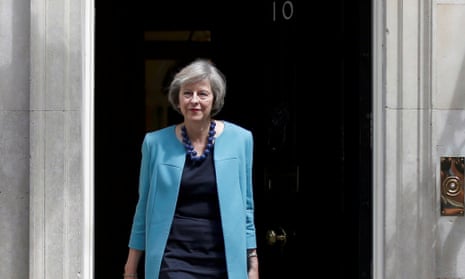Theresa May’s plan to reform boardroom governance in the UK is extraordinary. The next prime minister didn’t merely attack grotesque levels of pay in FTSE 100 boardrooms, a refrain heard in vague terms from most of the runners in the Tory leadership race. She also wants employees to be represented on company boards, a specific proposal that reopens a debate that hasn’t been aired seriously in mainstream British politics since the mid-70s.
If Labour was championing the policy, the battalions of big-business lobbyists would denounce the party as out of touch with the demands of modern competitive markets and thus unelectable. But May is about to enter Downing Street and her campaign pledge was unequivocal: “If I’m prime minister ... we’re going to have not just consumers represented on company boards, but workers as well.”
For good measure, May plans to abolish advisory shareholder votes on pay and make all votes binding. And she wants to make it impossible for the likes of asset-stripping, tax-minimising Pfizer to mount a takeover bid for a pharmaceutical titan such as AstraZeneca.
Those subsidiary pledges would themselves be remarkable in a Conservative leader. After all, it was opposition from Tory MPs during the coalition government that forced the then business secretary, Vince Cable, to water down his original proposals to curb excessive executive pay. May’s position seems close to Cable’s original Liberal Democrat vision. If so, big business has only itself to blame. If BP’s chief executive, Bob Dudley, can collect £14m in a rotten year for profits despite the opposition of his shareholders, what’s the point of advisory votes? The system becomes an elaborate dance around handbags. Reform is overdue.
In similar fashion, David Cameron tied himself in knots during the battle for AstraZeneca in 2014. The government had no formal powers to block the bid and Cameron engaged in a haphazard effort to secure pledges from Pfizer on jobs and investment, none of which appeared to be binding. Cameron was probably the most relieved person in the country when Pfizer, refusing to meet AstraZeneca’s demand for a higher offer, dropped its bid.
May will face a tough job selling her interventionist approach on takeovers to the free-market disciples in her party, but her stance is more honest than Cameron’s on-the-hoof attempt to throw up obstacles. May’s industrial policy, it seems, would mean the government having the right to tell future Pfizers to pfizz off. It will be applauded here. As argued at the time, the future of life sciences in the UK should matter more than Pfizer’s freedom to play clever games of tax arbitrage.

Big business – if pushed hard enough by a Tory prime minister – would probably swallow binding votes on pay and a block on takeovers deemed not to serve the national interest. Advisory votes satisfy few; and, in practice, only a handful of companies might be affected by an end to the UK’s “open doors” approach on takeovers. But workers on boards? Expect company chairmen to splutter on their after-dinner brandies at the CBI’s next black-tie bash.
We’ll skip over May’s parallel promise to promote “consumers” to boards since it was heroically imprecise (a “consumer” of a Rolls-Royce aircraft engine is the customer, the airline, which would make price negotiations tricky). But the demand for workers on boards is of historical significance. It would reverse about 40 years of government thinking.
Harold Wilson’s government in 1975 set up a committee to respond to a European commission directive on worker representation. The Bullock report on industrial democracy in 1977 came out in favour of employees on boards – and, note, not a subsidiary board, but the main board. It never happened, of course. While West Germany reacted to the same directive by adopting a system that required all companies with more than 2,000 employees to have worker representation, the UK never jumped. After Margaret Thatcher’s victory in 1979, shareholder-led capitalism has ruled unchallenged by Westminster.
May’s proposal, therefore, would represent an almighty philosophical U-turn by the Tory party. Details are sketchy. Who would select the employee representatives – the bosses or the workers? There is a big difference between the two versions. Would the reform apply to all companies, or just those over a certain size? Would adoption be compulsory? What would be the penalty for non-compliance?
Critics will also argue – with some force – that the German model is not as shiny as it once seemed. Boardroom pay appears as wild in Germany as it does in the UK and the emissions scandal at Volkswagen has exposed a cosy set-up in which the executive class secured mega-bucks bonuses by sweet-talking the unions with employment guarantees. Mutual back-scratching – the ill May correctly identifies in UK boardrooms – can take different forms.
For now, though, celebrate the fact that fundamental principles of Britain’s boardroom governance are being rethought. It is a very welcome development. In the more enlightened quarters of the UK corporate world, they can see that boardroom pay has eroded trust in business. Hermes Investment Management, which advises on £170bn of funds, said bosses’ pay had probably contributed to the alienation felt by many leave voters. Business chiefs, furiously signing letters to the Times urging a vote for remain, were successfully portrayed by the leave camp as a self-interested cabal.
So, maybe, once they have recovered their brandies, the corporate big beasts will judge that their own survival requires more fresh air in boardrooms. That ultimate establishment figure Sir Mike Rake, the chairman of BT and former president of the CBI, said: “I don’t think business should reject out of hand what Theresa May has said.” Naturally, Rake offered caveats – “You have got to be careful before you leap in to appoint people on boards” – but his comments were far from being a blanket rejection of workers in the boardroom.
Details will be everything. But a Tory prime minister is now sounding more radical on boardroom reform than even Labour’s Ed Miliband ever did. Let’s hope she means it.











